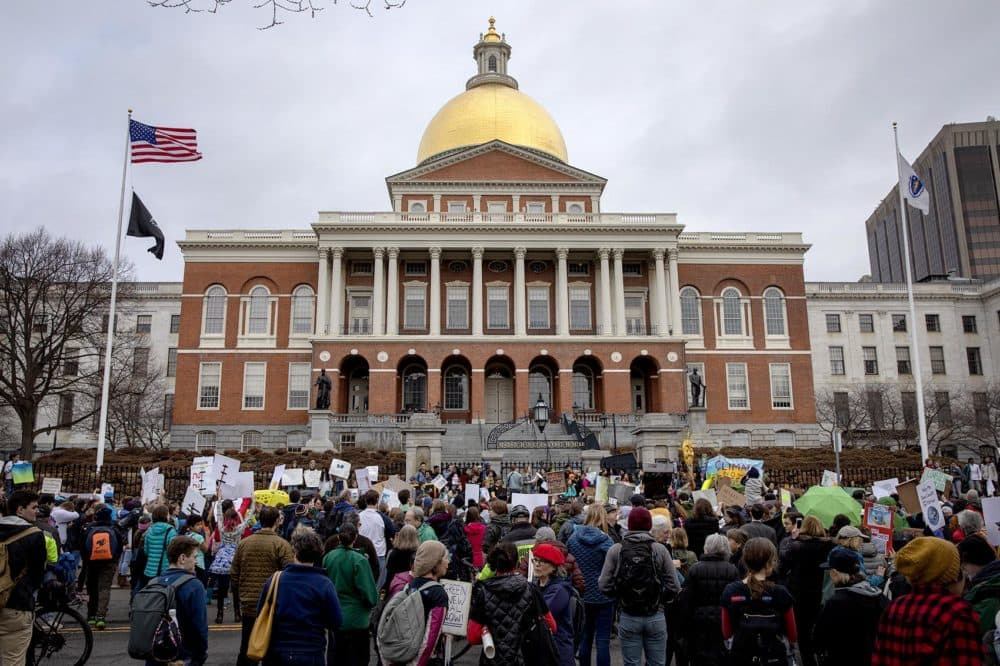Advertisement
Commentary
'It Redefines The Realm Of What Might Be Possible': Sign The Climate Bill, Gov. Baker

The climate bill currently sitting on Gov. Charlie Baker’s desk is bold and ambitious. It holds great promise for Massachusetts, as we transition to a clean energy economy that will bring cleaner air and job growth.
But it also has real consequences for the entire nation.
As former heads of New York State Energy Research and Development Authority (NYSERDA) and the Massachusetts Department of Environmental Protection (MassDEP), we know firsthand that state policymakers across the country are networked together, and are keenly aware of others’ steps forward — or backward — on energy and environmental policy. When one state passes and proves a new policy solution, it redefines the realm of what might be possible in the other 49.
Consider the moment that Massachusetts broke through and embraced marriage equality. The state’s experience was studied feverishly by policymakers who, for the first time in history, had a state roadmap for same-sex marriage. Our leadership gave others the path and the courage to follow, eventually culminating in a national, constitutional right embraced by the Supreme Court.
When one state passes and proves a new policy solution, it redefines the realm of what might be possible in the other 49.
Massachusetts has a similar legacy of pathbreaking climate policy. Though the state emits only 2% of national greenhouse gas (GHG) emissions, we have repeatedly expanded the climate policy frontier, contributing new policy tools to a global policy arsenal that can be used again and again.
For example, we were one of the first states in the nation to set legally binding GHG emissions reductions targets, and many states followed our lead thereafter. We helped launch the Regional Greenhouse Gas Initiative (RGGI), creating a durable market that drives energy efficiency investments, continues to curb pollution and welcome new member states. The Baker administration’s first-in-the-nation offshore wind procurements sparked a race along the Atlantic seaboard to harness this promising resource. His team has also led on cutting transportation sector greenhouse gas emissions with bold vehicle electrification goals and the regional Transportation and Climate Initiative.
This bill takes that leadership to the next level. It establishes a legally binding goal of a 50% reduction in GHG emissions below 2005 levels by 2030. This would be the most ambitious short-term target in the country. It would put Massachusetts on track to reach net zero GHG emissions by 2050 — the goal that the world’s best scientists tell us we must meet to “flatten the curve” on global warming. The bill couples these targets with specific and welcomed policies, including doubling down on offshore wind energy, phasing out gasoline and diesel-powered engines in favor of vehicles powered by clean electricity, and converting from gas and oil burners to more efficient electric heat pumps to heat our homes. The bill also integrates environmental justice with our actions to combat climate change, a long overdue and necessary alignment.
Rarely has one piece of legislation in one relatively small state meant so much to so many.
As former state officials, we understand that the governor has reservations about the bill stemming from the all-too-often messy legislative process, and in particular the limited time afforded to the administration to recommend changes to the bill. These are valid concerns, but we trust that if there are imperfections in the bill (which there always are), these can be remedied with supplemental legislation.
Above all else, we are at a unique moment in our nation’s history, when we are desperate for a demonstration of a bipartisan commitment to tackling our most pressing problems. At the federal level, such examples are vanishingly small. Even at the state level, examples are few and far between.
The governor’s signature on this bill will be a stunning example of the bi-partisan leadership that we need — it models the behavior that’s so essential to move forward as a nation.
Rarely has one piece of legislation in one relatively small state meant so much to so many.
Alicia Barton is the CEO of First Light Power, the largest clean power producer in New England. She previously served as the president and CEO of the New York State Energy Research and Development Authority (NYSERDA) and the Massachusetts Clean Energy Center.
Ken Kimmell is the former commissioner of the Massachusetts Dept. of Environmental Protection and the former president of the Union of Concerned Scientists.